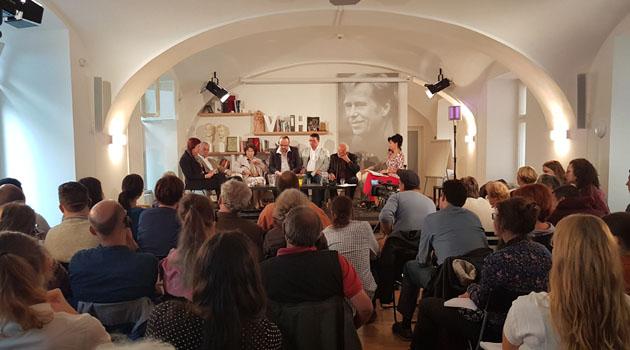Roma and Sinti Genocide Survivors, Descendants and Scholars Unite in Prague

Roma and Sinti Genocide Survivors, Descendants and Scholars Unite in Prague By Clare Profous. September 20 – 21, 2017 In what way have memories of the Roma genocide affected survivors and their descendants? How have these experiences continued to influence Roma and their treatment within Europe since 1945?
These were some of the questions discussed this past week at the two-day conference Tracing the Legacies of the Roma Genocide: Families as Transmitters of Experience and Memory. The conference brought together two international academic initiatives, the research network “Legacies of the Roma Genocide in Europe since 1945”, funded by the Arts and Humanities Research Council (AHRC) in the UK and the Prague Forum for Romani Histories.
Roma throughout Europe were subject to violence and persecution by Nazi Germany and its allies in the 12 years leading up to 1945, when hundreds of thousands of Roma were murdered.
Among other forms of persecution, Roma and Sinti were forced to personally experience or witness friends and relatives become victims of mass killings, were forced into gas chambers and killed there, were sent on death marches or were subjected to other forms of violence during and after the war – including sexual violence and mass sterilization.
Helena Sadílková, Ph.D, the Head of the Seminar of Romani Studies at Charles University and one of the main organizers of the event, explained what this new endeavor is about: “The Prague Forum for Romani Histories was established not only to foster a debate among scholars from different fields that focus on the history of the Roma and thus to support historical scholarship in Romani studies, but also to help to integrate such research into the wider field of European history – not as a separate/parallel minority history, but as an integral part of European history and an important lens that can deepen our understanding of the historical processes that have shaped the history of European societies”.
Speakers were invited from across the globe to reach this goal of fostering transnational discourse, including Professor Tara Zahra of Chicago University and Ari Joskowicz, an Associate Professor at Vanderbilt University.
Scholars described their research in different regions of Europe including former Czechoslovakia, Ukraine, Romania, Hungary, France, Belarus and Lithuania. Their work focused on the effects and coping mechanisms related to trauma, the transmission of memory within families as well as private and public forms of commemoration, and institutional practices regarding the treatment of Roma in post-war Europe.
The purpose of the conference was twofold. Not only did it allow scholars to share ideas, but it also promoted close collaboration and the co-production of knowledge between academics and members of diverse Romani communities. Researchers were joined by Roma and Sinti survivors and their descendants, who spoke of their experiences as victims of persecution and how that past continues to fuel present-day discrimination. They also spoke of the challenges they face as they work towards coming to terms with the tragedies affecting them and their families.
This discussion marked the opening of the exhibition by Eve Rosenhaft and Jana Müller titled: “…don’t forget the photos, it’s very important…” The Nationalist Socialist Persecution of Central German Sinti and Roma at the Václav Havel Library in Prague.
“The research of the history of the Roma suffers from fragmentation and remains … on the margins of the field of history as an academic discipline in general. We, however, believe that the research in the history of Roma has a great potential in contributing to the existing historic and historiographic debates on the processes and developments in Europe since the 19th century in terms of, i.e., (dis)continuities of certain social and institutional practices as well as the questions of periodization, production of knowledge, or methodological as well as ethical concerns, etc.” says Sadílková.